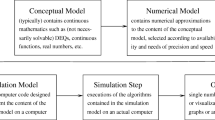Abstract
Simulations (both digital and analog) and experiments share many features. But what essential features distinguish them? I discuss two proposals in the literature. On one proposal, experiments investigate nature directly, while simulations merely investigate models. On another proposal, simulations differ from experiments in that simulationists manipulate objects that bear only a formal (rather than material) similarity to the targets of their investigations. Both of these proposals are rejected. I argue that simulations fundamentally differ from experiments with regard to the background knowledge that is invoked to argue for the “external validity” of the investigation.
Similar content being viewed by others
References
Campbell D. (1957) Factors relevant to the validity of experiments in social settings. Psychological Bulletin 54: 297–312
Chalmers D. (1996) Does a rock implement every finite-state automaton?. Synthese 108: 309–333
Dowling D. (1999) Experimenting on theories. Science in Context 12(2): 261–273
Gilbert N., Troitzsch K. (1999) Simulation for the social scientist. Open University Press, Philadelphia
Guala F. (2002) Models, simulations, and experiments. In: Magnani L., Nersessian N. (eds) Model-based reasoning: Science, technology, values. Kluwer, New York, pp 59–74
Hacking I. (1983) Representing and intervening. Cambridge University Press, Cambridge
Hughes R. (1999) The Ising model, computer simulation, and universal physics. In: Morgan M., Morrison M. (eds) Models as mediators. Cambridge University Press, Cambridge
Humphreys P. (1995) Computational empiricism. Foundations of Science 1: 119–130
Morgan M. (2002) Model experiments and models in experiments. In: Magnani L., Nersessian N. (eds) Model-based reasoning: Science, technology, values. Kluwer, New York, pp 41–58
Morgan M. (2003) Experiments without material intervention: Model experiments, virtual experiments and virtually experiments. In: Radder H. (eds) The philosophy of scientific experimentation. University of Pittsburgh Press, Pittsburgh, pp 216–235
Norton S., Suppe F. (2001) Why atmospheric modeling is good science. In: Miller C., Edwards P.N. (eds) Changing the atmosphere: Expert knowledge and environmental governance. MIT, Cambridge, pp 67–105
Parker, W. (this volume). Does matter really matter: Computer simulations, experiments, and materiality.
Simon H. (1969) The sciences of the artificial. MIT, Boston
Siono, S. (Ed.). (1962). Proceedings International Symposium on Numerical Weather Prediction in Tokyo, November 1960. Tokyo: Meteorological Society of Japan.
Stillinger F.H., Weber T.A. (1985) Computer simulation of local order in condensed phases of silicon. Phyiscal Review B 31: 5262–5271
Winsberg E. (1999) Sanctioning models: The epistemology of simulation. Science in Context 12(2): 275–292
Winsberg E. (2003) Simulated experiments: Methodology for a virtual world. Philosophy of Science 70: 105–125
Author information
Authors and Affiliations
Corresponding author
Rights and permissions
About this article
Cite this article
Winsberg, E. A tale of two methods. Synthese 169, 575–592 (2009). https://doi.org/10.1007/s11229-008-9437-0
Received:
Revised:
Accepted:
Published:
Issue Date:
DOI: https://doi.org/10.1007/s11229-008-9437-0




